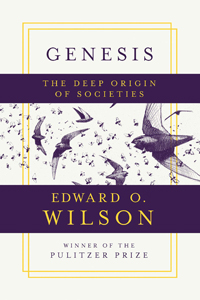 Edward O. Wilson, Genesis: The Deep Origin of Societies (New York: Liveright, 2019), 153pp.
Edward O. Wilson, Genesis: The Deep Origin of Societies (New York: Liveright, 2019), 153pp.
Edward Wilson (b. 1929), still working away in his nineties, is widely considered one of the most important biologists in the world today. Since 1996 he's been an emeritus professor at Harvard, where he's spent some forty years. He's written over thirty books, two of which won Pulitzer Prizes.
Wilson is an interesting figure partly because of his ambiguous reflections on religion. He never tires of describing how he was raised in the evangelical faith of the Southern Baptists, a faith that he rejected long ago in favor of scientific humanism. He was one of the authors of the 1973 "Humanist Manifesto." He's described himself as more of an agnostic than an atheist, and in one place called himself a "provisional deist." He has also argued for the unification, convergence, synthesis, or "consilience" of science and the humanities. In his book The Creation (2006), written as a letter to a fictional pastor, he even says that scientists ought to "offer the hand of friendship" to religious leaders and build an alliance with them, stating that "science and religion are two of the most potent forces on Earth and they should come together to save the creation."
Still, Wilson can be very hard on (organized) religion. He considers it the main source of violence and tribalism, an "irrational" obstacle to progress that we must outgrow. The grand narrative of science, "not the archaic version soaked in religion and ideology," is "clear and massive." In The Meaning of Human Existence (2014), he writes, "We were created not by a supernatural intelligence but by chance and necessity as one species out of millions of species in Earth's biosphere. Hope and wish for otherwise as we will, there is no evidence of an external grace shining down upon us, no demonstrable destiny or purpose assigned us, no second life vouchsafed us for the end of the present one."
And so he begins his most recent book Genesis by lamenting how philosophy and religion have at best "non-confirmable" answers to life's most important questions, and how these important questions have been "enslaved by religion and political dogma." Whereas religion consists of "fantasy" and the "bizarre," science offers "objective and persuasive" answers, the "real creation story," which is a "factual story" that's "vastly different" from religious myths.
In 125 short pages, Genesis explores a particular question about the origins of society. If evolution advances through selfish genes, what Wilson calls "the seeming absolute priority of selfish personal success," how do we explain "eusociality" — altruistic behavior, the co-operative division of labor, and advanced group societies? And why is this "eusociality" so late and so rare? To answer this question, Wilson appeals to the field of sociobiology that he helped to found in the 1970s, which explains social behavior in evolutionary terms. In the end, he appeals to group selection as summarized by David Sloan Wilson: "within groups, selfish individuals win against altruists, but groups of altruists beat groups of selfish individuals." He admits that this is an idea that is "clouded by controversy," but it's where he abruptly ends his volume. And besides, "almost no scientific explanation is complete and final in every detail."
Dan Clendenin: dan@journeywithjesus.net


